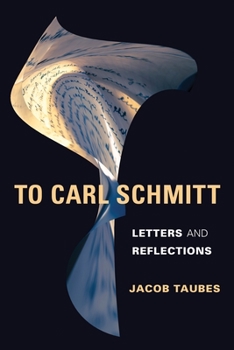To Carl Schmitt: Letters and Reflections
(Part of the Insurrections: Critical Studies in Religion, Politics, and Culture Series)
A philosopher, rabbi, religious historian, and Gnostic, Jacob Taubes was for many years a correspondent and interlocutor of Carl Schmitt (1888-1985), a German jurist, philosopher, political theorist, law professor--and self-professed Nazi. Despite their unlikely association, Taubes and Schmitt shared an abiding interest in the fundamental problems of political theology, believing the great challenges of modern political theory were ancient in pedigree and, in many cases, anticipated the works of Judeo-Christian eschatologists.
In this collection of Taubes's writings on Schmitt, the two intellectuals work through ideas of the apocalypse and other central concepts of political theology. Taubes acknowledges Schmitt's reservations about the weakness of liberal democracy yet distances himself from his prescription to rectify it, arguing the apocalyptic worldview requires less of a rigid hierarchical social ordering than a community committed to the importance of decision making. In these writings, a sharper and more nuanced portrait of Schmitt's thought emerges, as well as a more complicated understanding of Taubes, who has shaped the work of Giorgio Agamben, Peter Sloterdijk, and other major twentieth-century theorists.Format:Hardcover
Language:English
ISBN:0231154127
ISBN13:9780231154123
Release Date:May 2013
Publisher:Columbia University Press
Length:120 Pages
Weight:0.65 lbs.
Dimensions:0.7" x 5.8" x 8.3"
Grade Range:Postsecondary and higher
Related Subjects
Philosophy Political Science Politics & Social Sciences Religion Religion & SpiritualityCustomer Reviews
0 rating





